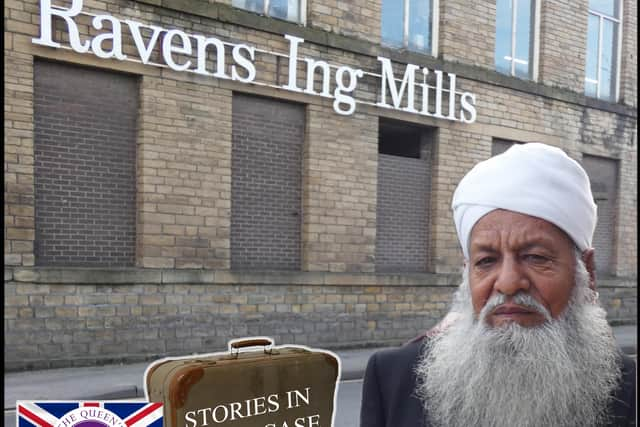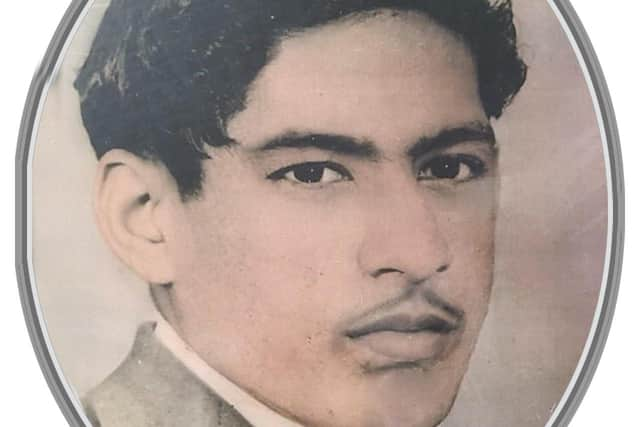Ravensthorpe Stories In A Suitcase: What Haji Ji did for the community after he settled into his new life in Dewsbury
and live on Freeview channel 276
He was part of a large group of Indian and Pakistani nationals who were encouraged to come and work in our local mills throughout the post-war decades of the 1960's and 1970's. These men came to Britain because of a severe labour shortage existing during that period across the whole country.
As someone who now belongs to a dwindling generation, Mr. Afzal agreed to be interviewed for the Kirklees Faith Network's "Ravensthorpe Stories In A Suitcase Project". In this second feature, Mr. Afzal talks about what he did for the local community after settling into his new Dewsbury life.
Advertisement
Hide AdAdvertisement
Hide AdSpeaking to the Reporter Series, Mr. Afzal said: "I came to Dewsbury in September 1960 at a time when the area's mills were desperately looking for manual labourers. It was not too long afterwards when I found a job within days of arriving into the town - at the Newsome Spedding Aldermaston mill situated on Aldams Road.


“This huge factory stood on the exact whole area where today the Church Of The Nazarene, along with Dewsbury Police Station, and where the town's bus station has been built. There was obviously no ASDA across the road. Instead, small busy shops were the real heartbeat of all our town centres.
“I began working as a machine operator at this carpet yarn manufacturing mill from Monday to Friday. The start time of my daily shift was 8.00am in the morning, with one hour for dinner between 12.00pm until 1.00pm. I would finish the day’s work after clocking off at 8.00pm in the evening. My weekly wage was £ 3.50! Such an amount was a lot of money in those days.
"Coming from a Muslim faith background, I had already got into the habit of praying 'Namaz' five times a day since my early teenage years.
Advertisement
Hide AdAdvertisement
Hide Ad“I did not break this important habit even after I joined the workforce at Newsome Spedding Aldermaston Mill because the worship was only taking up a few minutes of my lunch and tea-break.


"The mill's proprietor in that period was a lovely kind-hearted gentleman called Mr. William Graham. This humane individual began to show me a great deal of affection when he found out I was praying quietly during my own time. Mr. Graham was so impressed by my character that he appointed me one of the mill's Foremen in 1964.
"I continued working on the same routine shift pattern even after the mill moved from the Aldams Road town centre site in April 1964 to Huddersfield Road in Ravensthorpe. I also moved with my workplace like hundreds of other workers. The mill then changed its name to Ravens Ing.
"It was in that same year of 1964 when I bought a new house in Ravensthorpe. My wife arrived from Pakistan to join me in the following year 1965. Her arrival made me realise I was likely to be staying in England longer than I expected. We had our first child - a baby daughter in 1966. But the infant died after just 10 days.
Advertisement
Hide AdAdvertisement
Hide Ad"Her death was one of the reasons why I got involved doing some unpaid community work. My daughter needed a burial according to Muslim custom. But there was no Muslim cemetery in Dewsbury during this period, let alone anywhere else across the former West Ridings borough.
"Kirklees Council did not exist in those days. So, I had to negotiate with the local 'Dewsbury Town Council' to purchase a plot of land within the town’s main cemetery grounds.
"The town council eventually agreed to set aside space for thirty Muslim graves at a cost of £300 - which was a huge amount for that post-war era.
“I and two other men paid for the plot out of our entire savings. An area of land was then designated next to the cemetery's wall overlooking Ravenshouse Road.
Advertisement
Hide AdAdvertisement
Hide Ad“The years passed, and I slowly made friends with most of my lovely white English-speaking neighbours.The Pakistani lads knew me anyway because of our common language.
"I stayed on working throughout the 1970's at Ravens Ing Mill, and was promoted as works manager in 1979. After my promotion, I advised the owners to open up a carpeted prayer room, with ablution wash facilities, for the Muslim employees. An hour was also given off - with pay - for anyone who wanted to attend the weekly 'Friday congregational 'Jumma Namaz' prayers at the local Mosque.
“These achievements were obviously important, yet I was more worried for the future of all those boys whom I had seen growing up over the years on the streets of Ravensthorpe. Most were unemployed and not doing anything since having left school.
"So, I helped a number of these young men by finding full-time employment for them at the same Ravens Ing Mill where I myself was working. I felt happy to speak directly with the management on their behalf. It was like giving a verbal reference. A person's skin colour did not matter to me - white-English or Pakistani, they were our children and our future.
"I finally retired from mill work in 2005 to spend more time praying at my local Anwaar-E-Madina Jamia Mosque.”